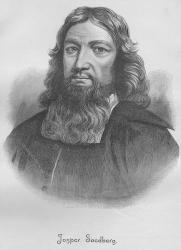
1590 - 1667 Composer of "WERDE MUNTER, MEIN GEMÜTHE" in Hymnal and Order of Service Johann Schop Germany 1590-1667. Born at lower Saxony, Germany, he became a Lutheran composer and violinist, much admired for his virtuoso and technical ability. In 1614 Duke Friedrich Ulrich made him a probationary musician in the Hofkapelle at Wolfenbuttel. He performed playing various instruments, but excelled as a violinist. He was engaged permanently in 1615, but the same year he responded to a summons to join the flourishing musical establishment of King Christian IV of Denmark in Copenhagen. There he met English viol player, William Brade, who had earlier been in service to Hamburg, Germany (and may have taught Schop there). Schops compositions for the violin set impressive demands for that area at that time. He also played other instruments, including the violi, lute, cornet, trombon, trumpet, zinke, and violin (virtuoso). In 1619 Schop and Brade left Copenhagen to escape the plague. He then went to Iburg, where he worked at the courtof the Osnabruck bishop, Philipp Sigismund. Schop had such a reputation that he soon acquired a post as Kapellmeister at an establishment in Hamburg and was the first member of the council music. In 1621 he was its director and the leading municipal violinist in that city, which offered him a substantial income for his participation in the church music program. He also was organist at the Jacobikirche. In 1634 he again traveled to Copenhagen with Heinrich Schutz and Heinrich Albert for the wedding of Crown Prince Christian. He won a violin contest there. Few German violinists were of his caliber musically. He returned to Hamburg, and the Danish king tried several times to woo him back to Denmark, but he stayed in Hamburg, becoming a director of music. He published books of violin music in 4 to 6 parts. He wrote two books of well-loved dance pieces and sacred concertos. He co-founded a school of song writing there in Hamburg with Thomas Selle. Many of his tunes were writtten for fellow townsmen and friend Johann Rist. Some of his music was performed at the Peace of Westphalia celebrations. Some of his tunes were used by chants in a cantata. Schop was married (wife’s name not found) and they had two sons, Johann II, and Albert, who also became musicians. He died in Hamburg.
John Perry
Johann Schop


 My Starred Hymns
My Starred Hymns




